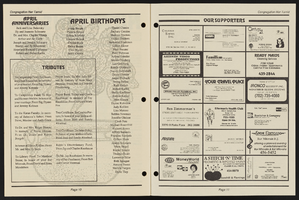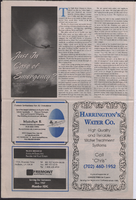Search the Special Collections and Archives Portal
Search Results
Jay C. Sarno Jr. oral history interview
Identifier
Abstract
Oral history interview with Jay C. Sarno Jr. conducted by David G. Schwartz on July 10, 2008 for the Remembering Jay Sarno Oral History Project. Sarno begins by discussing how his parents met in the early 1950s in Miami, Florida and were married within six weeks. Sarno then describes his family moving to Las Vegas, Nevada in 1965 and living in the Dunes Hotel for the first three weeks. Sarno then chronicles his parents’ marriage and their divorce in the 1970s. Sarno then recounts his father’s relationship with Jimmy Hoffa and Allen Dorfman and the visits Hoffa made to Las Vegas to see his father. Sarno talks about the way his father treated him and his brother differently than his sisters. Lastly, Sarno discusses how he and his siblings were surprised their father owed the Internal Revenue Service over one million dollars at the time of his death.
Archival Collection
Frank Scott Papers
Identifier
Abstract
The Frank Scott Papers date from 1940 to 1984 and contain promotional materials, photographs, and menus from the Union Plaza Hotel; University of Nevada, Las Vegas (UNLV) basketball memorabilia; and KRLR TV documentation, correspondence, and news clippings. The collection also contains a scrapbook and photographs of the re-opening of the Mizpah Hotel in Tonopah, Nevada.
Archival Collection

Cecia Alvarado oral history interview: transcript
Date
Archival Collection
Description
Oral history interview with Cecia Alvarado conducted by Barbara Tabach on September 15, 2020 for the Latinx Voices of Southern Nevada Oral History Project. Cecia describes her personal history, moving to the United States as a teen in the year 2000. She talks of immigration, education, and her work as the State Director of "Mi Familia Vota."
Text

Erica Mosca oral history interview: transcript
Date
Archival Collection
Description
Oral history interview with Erica Mosca conducted by Cecilia Winchell, Stefani Evans, and Jerwin Tiu on February 3, 2023 for the Reflections: the Las Vegas Asian American and Pacific Islander Oral History Project. In this interview, Mosca reflects on her life journey from a low-income Asian American to a current serving Nevada State Assemblywoman. She recalls that most of her childhood was in Palm Springs, California where she enjoyed a diverse community of students within her education system. It was not until she moved to Navato, California where she first experienced the economic and resource gap between economically diverse areas. Mosca went on to be involved in a college readiness program and received a scholarship to Boston University. After college, Mosca went on to work for Teach for America where she was stationed on the east side of Las Vegas at Goldfarb Elementary School where she grew a passion for leadership. She eventually returned to school and graduated from Harvard University, returning to Las Vegas to start her nonprofit "Leaders in Training." Mosca hopes to inspire change in her communities by enacting legislation and initiatives targeted towards the communities she was and continutes to be a part of.
Text

Transcript of interview with Ernest Jackson Jr. by Larry E. Cooper, March 1, 1980
Date
Archival Collection
Description
On March 1, 1980, Larry E. Cooper interviewed general contractor Ernest (Ernie) Jackson Junior (born December 6th, 1932 in Bruce, Mississippi) in Cooper’s home about his experiences in the Westside as a Black Las Vegas resident. Jackson Jr. discusses the lack of property buyers on the Westside and his goals of improving the Westside by building on the land. Jackson Jr. also discusses his youth as a baseball star for Las Vegas High School in the fifties.
Text

Christine Szukala oral history interview: transcript
Date
Archival Collection
Description
Oral history interview with Christine Szukala conducted by Bridgette Foote on November 12, 2021 for Reflections: The Las Vegas Asian American and Pacific Islander Oral History Project. Christine shares her family history and the story of her Thai mother and American Air Force father who met in Thailand and married before moving to the United States in 1970. She talks about her upbringing in Las Vegas, Nevada near Nellis Air Force base with her six siblings. Christine discusses her beliefs of how her newly immigrated mother adapted to American life, including altering her recipes to fit her husband's taste and reducing her visits to nearby Buddhist temples.
Text
Southern Nevada Jewish Heritage Project
"The goal of this 2014-2015 project is to build a web and mobile resource that will connect researchers from around the world to thousands of historical items—photographs, brochures, scrapbooks, letters, drawings, videos, and more—detailing the lives and contributions of Jews in Southern Nevada. It will include carefully researched biographies, timelines, and histories of institutions, events, and prominent themes showing the integral roles Jews have played in the history of Southern Nevada.
Corporate Body
Kirsten Searer (Nevada Public Education Foundation) oral history interview conducted by Magdalena Martinez and Taylor Cummings: transcript
Date
Archival Collection
Description
From the Lincy Institute "Perspectives from the COVID-19 Pandemic" Oral History Project (MS-01178) -- Education sector interviews file.
Text


